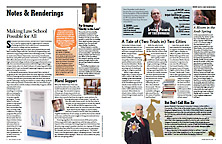A Tale of (Two Trials in) Two Cities
Printer Friendly Version University Professor Joseph Weiler saw both sides of a European courtroom this year—and twice emerged victorious. As a defendant, Weiler, Joseph Straus Professor of Law, enjoyed a not guilty verdict in a closely watched libel trial. As counsel, he argued and won a landmark ruling on religious symbols.
University Professor Joseph Weiler saw both sides of a European courtroom this year—and twice emerged victorious. As a defendant, Weiler, Joseph Straus Professor of Law, enjoyed a not guilty verdict in a closely watched libel trial. As counsel, he argued and won a landmark ruling on religious symbols.
Weiler’s legal odyssey began after a review of Karin Calvo-Goller’s The Trial Proceedings of the International Criminal Court: ICTY and ICTR Precedents appeared on a book review website he edits. Unhappy with the review, Calvo-Goller asked that it be removed. When Weiler declined, Calvo-Goller, a French citizen living in Israel, filed a criminal complaint in France against him.
Aside from the author’s nationality, the only French connection was that the review could be accessed online in France. Experts feared that a guilty verdict could have made anything published online a potential target for criminal prosecution, producing a chilling effect on freedom of expression worldwide. In its March ruling for Weiler, the Tribunal de Grande Instance de Paris characterized the lawsuit as forum shopping and deemed the review legitimate criticism. Following the verdict, Dean Richard Revesz said, “We are so proud of our remarkable colleague, who stood firm for the cause of intellectual freedom.”
Later that month in Strasbourg, Weiler was rewarded for standing up in support of another freedom: Italy’s right to display crucifixes in public classrooms. Weiler had argued the case pro bono the previous June. In a decision Weiler characterized as “a rejection of a one-size-fits-all Europe,” the Grand Chamber of the European Court of Human Rights ruled in favor of Italy. “Europe,” Weiler said, “is special in that it guarantees at the private level both freedom of religion and freedom from religion but does not force its various peoples to disown in its public spaces what for many is an important part of the history and identity of their states.”
—

 Multimedia
Multimedia